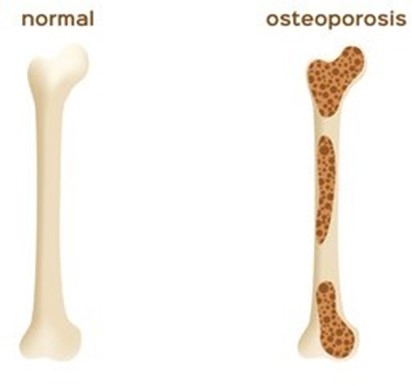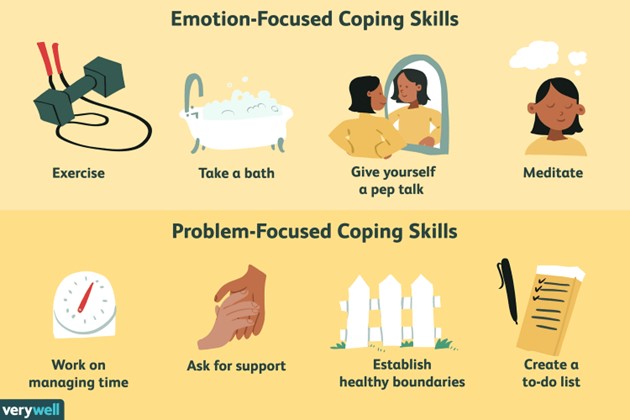A nurse is collecting data from a female client who has anorexia nervosa. Which of the following findings should the nurse expect?
Decreased cholesterol levels
Heavy monthly periods
Elevated serum potassium level
Low bone density
The Correct Answer is D
When collecting data from a female client who has anorexia nervosa, the nurse should expect a finding of low bone density.
Anorexia nervosa is an eating disorder characterized by self-starvation, distorted body image, and a fear of gaining weight. Clients with anorexia nervosa are at risk for severe malnutrition, which can lead to a variety of complications, including bone loss and osteoporosis.

Options A, B, and C are incorrect findings in a client with anorexia nervosa. Decreased cholesterol levels may be an indication of malnutrition. Heavy monthly periods, or menstrual irregularities, may occur in clients with anorexia nervosa because of the hormonal changes that can result from severe weight loss. Elevated serum potassium levels are not a common finding in a client with anorexia nervosa.
Nursing Test Bank
Naxlex Comprehensive Predictor Exams
Related Questions
Correct Answer is ["C","E"]
Explanation
"I call a friend who makes me smile and laugh," and "I tense and release my muscles, starting with my feet." These are adaptive coping strategies that help to reduce stress and promote relaxation. Calling a friend who makes you smile and laugh, for example, can help to distract from negative thoughts and promote positive emotions. Tense and release exercises can help to reduce muscle tension and promote relaxation.

Choice A, "I sleep in in the mornings," is not an adaptive coping strategy because it doesn't address the source of stress and may actually lead to avoidance.
Choice B, "I isolate myself in my room for a few hours when things get overwhelming," is not adaptive because it promotes social withdrawal and avoidance.
Choice D, "I think about being on my favorite beach vacation," is not adaptive because it promotes avoidance and doesn't address the source of stress.
Correct Answer is B
Explanation
Answer: B. 6-year-old child who has a spiral fracture of the tibia and fibula, which reportedly occurred while riding a bicycle.
Rationale:
A) 3-year-old toddler with scalding burns over the face and chest reportedly sustained when the child pulled on a tablecloth, spilling a cup of tea on himself:
Scalding burns in young children can be accidental, especially if the burns are consistent with typical patterns seen in such accidents. However, burns covering a large area, especially on the face and chest, may warrant further investigation to rule out abuse, particularly if the explanation seems inconsistent with the injury.
B) 6-year-old child who has a spiral fracture of the tibia and fibula, which reportedly occurred while riding a bicycle:
A spiral fracture is often associated with a twisting or rotational force, which is less common in typical bicycle accidents. Spiral fractures in children can be indicative of physical abuse, particularly if the explanation for the injury does not fit the typical mechanisms of injury associated with the reported activity. This type of fracture should prompt a thorough evaluation for possible abuse.
C) 14-month-old toddler who is reportedly learning to walk and has several bruises on bony prominences of the lower legs and elbows:
Bruises on bony prominences are common in toddlers who are learning to walk and are prone to minor falls. This pattern of bruising is usually consistent with typical developmental activities rather than abuse. However, repeated or severe bruising should still be evaluated carefully.
D) 9-month-old infant who sustained near drowning when he reportedly climbed into the tub and turned on the water:
While near drowning in an infant is a serious concern, it is less likely to be related to physical abuse if the explanation involves an accidental event. A thorough assessment is necessary to ensure safety and prevent further incidents, but the described scenario is not as indicative of abuse as a spiral fracture.
Whether you are a student looking to ace your exams or a practicing nurse seeking to enhance your expertise , our nursing education contents will empower you with the confidence and competence to make a difference in the lives of patients and become a respected leader in the healthcare field.
Visit Naxlex, invest in your future and unlock endless possibilities with our unparalleled nursing education contents today
Report Wrong Answer on the Current Question
Do you disagree with the answer? If yes, what is your expected answer? Explain.
Kindly be descriptive with the issue you are facing.
